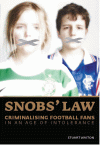A brilliant new book says the criminalisation of football songs in Scotland is a vivid illustration of how tolerance is morphing into intolerance – continue for Kevin Rooneys full Review
Snobs’ Law: censoring Scottish football fans : A Review
 I am struck by how many thinkers today have become preoccupied with drawing the boundaries of tolerance. This was particularly brought home to me when reading the weekend newspapers after the acquittal of Chelsea and England player John Terry at his trial for allegedly directing racial abuse at an opponent.
I am struck by how many thinkers today have become preoccupied with drawing the boundaries of tolerance. This was particularly brought home to me when reading the weekend newspapers after the acquittal of Chelsea and England player John Terry at his trial for allegedly directing racial abuse at an opponent.
Almost every commentator on the case argued for more restrictions on the language used by footballers and many called for bans to be extended to homophobic and misogynist language as well as racism. One columnist went so far as to call for the criminalisation ‘of any football songs that people find offensive’. The Northern League, a semi-professional football league based in the north-east of England, announced a zero-tolerance strategy for swearing. A Sunday Times writer argued that any players or fans uttering rants filled with four-letter words should be banned from future games, even if that means half-empty stadiums.
With the honourable exception of Rod Liddle, also writing in The Sunday Times, it has been almost impossible to find anyone in the mainstream press prepared to defend John Terry’s right to free speech and to challenge this illiberal moral crusade. This is partly because the clamour for more restrictions is not seen in the context of a threat to civil liberties and free speech, but instead is presented as a desire to rid the game of an unpleasant legacy of racism and sexism that belongs to a bygone era. Who could possibly object to society saying that black footballers should no longer have to put up with being called a ‘black cunt’ every time they get the ball? If it takes a few rules and regulations to drive that message home, then so be it, we are told. Few are prepared to go into battle on behalf of overpaid footballers whose reaction to a tackle is to unleash a string of expletives designed to provoke and enrage their opponents.
Try as I might, I have failed to persuade some lifelong friends that defending the right of footballers to free speech does not mean you have to like what these foul-mouthed players say. I even had special football t-shirts made for my Celtic-supporting mates, with the Celtic crest on the front and that well-known quote attributed to Voltaire on the back: ‘I may detest what you say but will defend to the death your right to wear it’. It was all to no avail. The slippery slope from banning racist language to banning swearing or ‘anything offensive’ is a product of our collective failure to hold the line and support the principle of our hard-won liberty of free speech. Tolerance used to mean, and still should mean, tolerating people and words that we may not like.

The arrival of a new book on the subject, which aims to challenge this mainstream view, is therefore very welcome. Snob’s Law: Criminalising Football Fans in an Age of Intolerance by the Dundee academic and liberties campaigner Stuart Waiton is an uncompromising rebuke for those leading the criminalisation of football fans and players. It’s also a call for the rest of us to wake up and smell the coffee. Waiton asks the questions that no one else is asking: at what stage did disapproval of what footballers and their fans say turn into sufficient justification to put them in a court room or a prison cell?
Waiton starts the book discussing the new legislation passed in Scotland last year, the Offensive Behaviour at Football and Threatening Communications Act, which gives the authorities the power to imprison fans for up to five years for singing banned songs and chants. Waiton shows how the slippery slope we now see in the debate over John Terry also governed the introduction of this law. Politicians originally claimed that the aim was to combat sectarianism at games between Glasgow’s ‘Old Firm’ rivals, Celtic and Rangers. But before long, the scope of the law had widened to include other songs and chants that people might find offensive. One interesting chapter, entitled ‘The New Sectarianism’, discusses the new and growing predisposition for some Celtic and Rangers fans to take offence at slogans they have tolerated for many years. Waiton shows how this trend has actually exacerbated and formalised sectarian rivalries, with fans of each team using the new laws as a snitcher’s charter to report rival fans to the authorities.
By far the most uncompromising chapter is that from which the book takes its title. Waiton argues that the metropolitan elites who are leading the calls for these new laws and restrictions are ‘snobs’ who can barely disguise their contempt for the working-class people who make up the vast majority of football fans. Rather than accept that new laws were needed in Scotland to stem a rise in sectarianism, Waiton turns the narrative on its head and focuses on the behaviour of politicians rather than fans.
Politicians, Waiton observes, have started to see football fans as a problem that needs to be dealt with rather than as a group of fellow citizens. They have lost the ability to see the difference between words at a football game and actions off the pitch. From this starting point, political leaders have claimed that what is needed is an ever-growing list of rules and regulations to control what these fans do and say. The criminalisation of ‘communications’ was the predictable conclusion of this outlook. The fact that sectarian chanting at games has declined over recent years – and that sectarianism in wider Scottish society is at an all-time low – is seen as irrelevant to politicians on a moral crusade.

In one chapter, Waiton quotes approvingly and extensively from a well-known Scottish journalist, Graham Spiers. In the late 1990s, Spiers made observations similar to those of Waiton about the middle-class preoccupation with the ‘red herring of sectarianism’: ‘In Glasgow, in the pubs and wine bars and especially around the hearths of the chattering classes, you wonder if we can’t let go of the tough subject matter of bigotry. You wonder if some of us would feel stripped naked if we could not continually hark on about this hate-fuelled city of ours.’
In the Nineties, Spiers stripped away the façade of what he called an ‘empty ritual’ of obsessing about Celtic and Rangers fans. He rightly pointed out that, outside of the 90 minutes that they ‘take the choir stalls’ at either end of the ground and scream at each other, these fans work together, drink together and play five-a-side football together with no problems.
But Waiton reveals that the author of these eloquent dismissals of the hysteria around Old Firm games has now been sucked into the moral panic around sectarianism. Giving evidence to the Scottish Parliament’s Justice Committee debate on the new laws last year, Spiers said he no longer wants to live in a country where thousands of people can shout ‘fuck the Pope’, and supported the call for such chants to be made illegal. Waiton uses Spiers to demonstrate the wider inability of even the most intelligent and liberal of commentators to resist the juggernaut of moralising against football supporters. This criminalisation of words is now leading to young fans being placed behind bars or losing their jobs and having their future careers stunted or destroyed. All this because the governing Scottish National Party (SNP) and the dinner-party set in west Glasgow and the posher parts of Edinburgh deem their distaste and disapproval of what Old Firm fans sing to be sufficient criteria to legislate to make singing such traditional songs an imprisonable offence.
What is so refreshing about Snob’s Law is that it not only defends free speech and free expression for everyone, but in doing so it seeks to reclaim the concept of tolerance. Left in the hands of the SNP and the chattering classes, tolerance is becoming denuded of its vital freedom-affirming meaning; instead, it is reduced to a form of polite etiquette. However, once you define tolerance as being nice to each other, it is only a matter of time before it morphs into its very opposite – intolerance towards those who are seen as offensive. Words and songs that are considered impolite and nasty become subject to censorship and criminalisation, as seen in the Offensive Behavior Act. Sadly, Waiton is also right to note that today in Scotland, as in England, calls for banning songs, policing thought and controlling behaviour often come from those who identify themselves as left-of-centre, open-minded and secular. This is why we have the bizarre situation where the intolerant and illiberal treatment of football fans (and players) is dressed in the rhetoric of liberal tolerance.
The failure of otherwise intelligent and liberal people like Spiers to see the new censorious climate as a dangerous attack on free expression only goes to show why Waiton’s book is so important. I hope that in a few years time, we will look back and see this book as the start of a fightback against the demonisation and criminalisation of football fans. But that will only happen if every fan – indeed, every citizen, hears the arguments within this book.
Kevin Rooney is a teacher based in London.
Snobs’ Law: Criminalising Football Fans in an Age of Intolerance by Stuart Waiton is now available. (Order this book via Amazon(UK)).
This article first appeared at Spiked : http://www.spiked-online.com/site/reviewofbooks_article/12828/

It seems certain folk would want to turn football into cricket or Wimbledon but that ain’t going to happen. However, there has to be a line drawn somewhere-do we want to listen to the likes of the famine song?
The difference between ‘offensive’ and racist and religious bigotry must be clearly defined to those who might have trouble differentiating (SNP-take note). Everybody is ‘offended’ by something or other. Where would we stop?
BTW, author what on God’s Earth is an ‘old-firm fan’? I’ve never met or heard of anyone in my life who is an old-firm fan. One half of tha supposed alliance doesn’t even exist anymore!
Will need to read this book, but I always said this legislation was NEVER about trying to solve anti-Catholic bigotry or Anti-Irish racism in Scotland, but was about Alex Salmond trying to make Scotland appear acceptable to the European and world communities! Can’t have the “Best Small Country in the World” being exposed as a bigoted racist country where Catholics and Irish are statistically EIGHT times more likely to be attacked than any other group. Salmond is a purely populist politician who jumps on bandwagons, and this legislation should NEVER have made statute!
There are heartstrings being tugged pretty vigorously in Kevin’s review. Perhaps the so called sensitive minds are merely creating their own ‘Maginot Lines’ to protect their delicate and fragile principles . History will certainly judge the last century or so as the age of legislation. Today the equation is simple. Law equals solution. In reality it is at best a damned cop-out and generally proves nothing but a bloody aggravation.
And damn proud of it!
Now would you like a cup of nice cup of tea and a biscuit (yes, a jaffa cake if you so wish!) or did you just pop by to stick your tongue out at us and say “Yaboo sucks to you Timmy”?
Away and play outside and be a good wee boy now.
With all due respect, literally… nonsense.
i’ll tell you why the legislation was necessary. because if i heard somebody singing, say, the delightful ditty about tommy burns, it would be me that would end up in the big hoose, and i don’t mean the one that cannot be tescoed.
you can argue that says more about me than them… you can argue that it should already be covered by breach of the peace legislation, but quite simply, practicalities say that no action was ever taken over that particular poem, which is designed to be overtly offensive, and by definition was intended to provoke that very reaction.
any law which incriminates instigators rather than, albeit reactionary, victims must be considered a positive step.
as to whether that vile number would however fall under the remit of the legislation is up to more legally wise folk than myself to decide.
let’s be honest here… there is onlyone club in the remit of this legislation, ie scotland, that has a sectarian problem. SIR david murray referred to them as the “FTP brigade.” he also however referred to them as being eradicated. the truth as we know is vastly different.
if the legislation can educate scotland’s shame from their neanderthal tendencies, it would be like harnessing the power to create fire for the unevolved.
although, the concept that those fans might one day possess the ability to create fire fills me with almost as much dread as the thought they may evolve opposable thumbs.
tom shields diary, think it was during eurochamps 96.
glasgow uni interviewing scottish football fans and asking what the worst two things in scottish football were.
rangers fan : secterianism and phenian bastards
celtic fan : secterianism and orange bastards.
Interesting parallels with Hillsborough and the recent revelations surrounding West Yorkshire Police and the Thatcher years in this article/ book excerpts. We need to keep asking the right questions. Power to the bloggers.